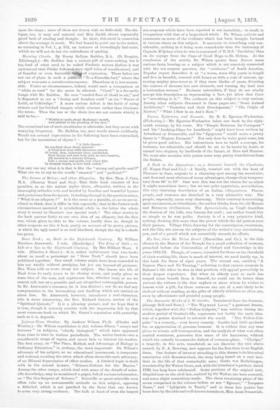Leisure-Time Studies. By Andrew Wilson, Ph.D. (Chatto and Windus.)—Dr. Wilson
republishes in this volume fifteen "essays and lectures" on subjects, "chiefly biological," which have appeared from time to time in various periodicals. The writer travois over a considerable range of topics, and never fails to interest his readers. The first essay, on "The Place, Method, and Advantage of Biology in Ordinary Education," is, perhaps, the most important. Dr. Wilson's advocacy of his subject, as an educational instrument, is temperate and rational, avoiding the error, which often discredits such advocacy, of an illiberal depreciation of other studies. A kindred topic is dealt with in the second lecture, " Scionce-Culture for the Masses." Among the other essays, which deal with some of the details of scien- tific knowledge, may be mentioned a paper, full of curious information, on "The Sea-Serpent of Science." Scientific or quasi-scientific men often take up an unreasonable attitude on this subject, opposing a disbelief, which is not justified by the facts that one knows, to some very strong evidence. The bulk at least of even the largest sea.serpents which have been reported is not incrodible,—is email, in comparison with that of a large-sized whale. Dr. Wilson collects and comments on some of the evidence which has been brought forward at various times on this subject. It amounts to something very con- siderable, nothing in it being more remarkable than the testimony of Captain M'Quhae when he was in command of H.M.S. Daedalus,' then on its voyage from tho Cape of Good Hope to St. Helena. At the conclusion of the article, Dr. Wilson quotes from Nature some curious facts, bearing on a subject which is not remotely connected with the sea•serpent question, the " minhocao" of South America. Popular report describes it as " a worm, some fifty yards in length and five in breadth, covered with bones as with a coat of armour, up- rooting mighty pine-trees as if they were blades of grass, diverting the courses of streams into new channels, and turning dry land into a bottomless morass." Eminent naturalists, if they do not wholly accept this description as representing a fact, yet allow that there is "something in it." The evidence on this subject is very curious. Among other subjects discussed in these pages arc, "Some Animal Architects," "Parasites and their Development," " The Origin of Nerves," "What I Saw in an Ant's Nest."


































 Previous page
Previous page